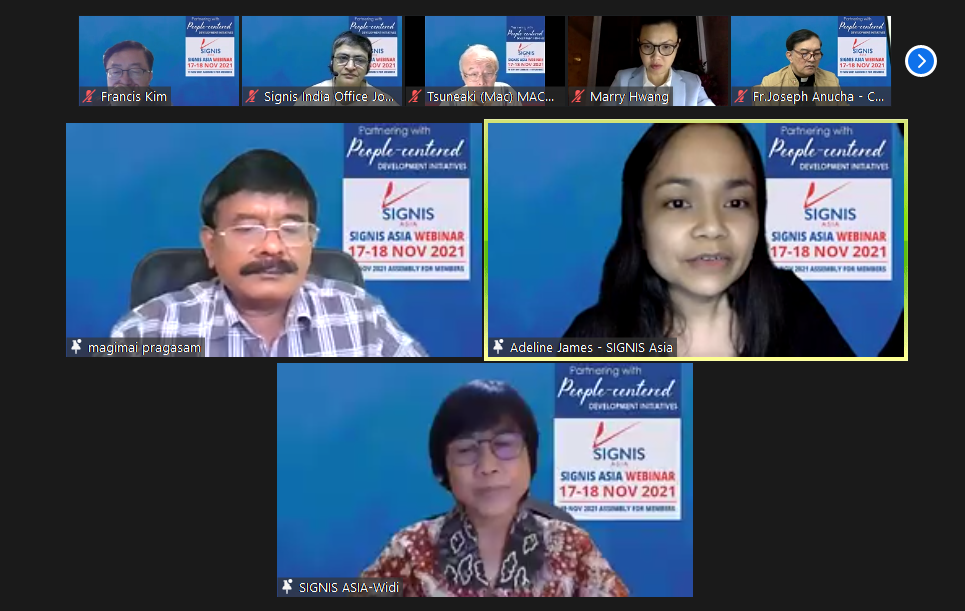(SIGNIS Asia). The Asia region of SIGNIS, the World Catholic Association of Communication organised a webinar on ‘Partnering with People-Centered Development Initiatives’ on 17-18 November 2021, participated by around 100 delegates from 14 countries.
‘The objective of the webinar is to have a deeper understanding of People-centered development concepts and explore ways and means to collaborate with action groups and like-minded organisations’ said Dr Magimai Pragasam, the Coordinator of the webinar and the Vice President of SIGNIS Asia.
‘Sustainability is an inherent component and explicit goal of people-centred development. Establishment of self-supporting social and economic systems remain the key elements of a sustainable society’ said, Mr Lawrence John, the Vice President of SIGNIS World during his inaugural address.
During the keynote address, Prof Bernard D’Sami of Loyola Institute of Social Science Research from Chennai said ‘around 45 % of Asian population lack access to sanitation and 68o million live without electricity. Asia has two-thirds of the world’s poor with 800 million surviving on less than USD 1.25 a day. He further said, ‘new technology, globalisation, and market-oriented reforms are the main reasons for rising inequality in Asia, and its high time that we focus on people-oriented development actions to bring about changes in people’s lives.
The webinar also discussed the current political crises in Afghanistan and Myanmar. ‘COVID 19 in Myanmar has hit the poor and the minors harder than the rest of the society ‘said Prof. Francis Loh of Malaysia. Alice Tan, one of the founders of’’Youth4Myanmar’ Movement shared how they mobilised the support of people from 24 countries across the globe.
‘Nearly 206,000 people have been displaced so far due to the conflict in Myanmar. Women along with their children do not have an adequate food supply. The act of gang rape of the mother of a one-month-old baby in front of her husband was an inhuman act and a heart-breaking violation of human rights’ said a person who did not want to disclose the identity. The person added, ‘Media and journalism can be a great assistance in the current situation in Myanmar. The media can be a good tool to represent the struggles of the people, to broaden the exposure. What is needed is ethical and responsible reporting to ensure lasting peace and safety’.
Pie Mabanta-Fenomeno of the Philippines defined ‘development communication models’ with suitable examples while Prof Donghun Chung of Korea shared strategies to counter the ‘digital divide’ in Asia.
‘We should avoid the use of plastics and reduce unnecessary personal expenditure’ said Prof. Arul Aram who spoke on Climate change in Asia. Prof Jinwon Lee of Korea depicted the vulnerability of women’s rights in Afghanistan and requested people to use social media extensively to expose the agony and pain of women in Afghanistan.
Fr. Frans Sales of Indonesia explained the importance of growing plants and producing organic manure. Shouri Reddy, the Director of Peoples Development Training Centre, Warangal said, ‘we need to build people before building organisations. People’s participation and empowerment are two important keys in development at the grassroots’. He narrated the ten development principles followed by Balavikasa where the marginalised women design their destiny.
‘We focus on training and commitment and the result can be seen in the field’, said Hiroshi Urushibara, the director of JLMM which has trained 64 Japanese lay missionaries so far, who are currently working among the disadvantaged across the globe.
Sr. Patricia of NISCORT presented a series of success stories where media tools are being used effectively in bringing about a change in people’s lives.
Widiandayani of Indonesia said,’ focusing on training, monitoring, evaluation, involving children in health activities and equipping women with skills to generate income are strategies followed in PRASADA NGO for resource mobilisation’.
Fr. Paul Sumasamo of Rome reiterated the fact that our development work will be a futile exercise if ‘holistic and human dignity dimensions’ are not present.
Aloysius James, a development expert, summarised the views of the participants at the end of the webinar. He said, ’people’s participation, access to policy information, advocacy and empowerment initiatives are the critical factors for development.
The statement of the seminar echoed those sentiments: ‘We affirm our role as communicators in the areas of research, media material production, training programmes, social activism and strive for greater involvement in mainstream media to influence policy-making in support of the establishment of fair democracies, using social media to build greater awareness, especially through people-based stories. We affirm our commitment to protecting our common home, in all possible ways, and to promote a culture of listening and dialogue’.
Fr. Joseph Anucha, the President of SIGNIS Asia thanked all the board members Dr Magi, Widiandayani, Francis Kim, Mac Machida, Adeline James and all who made this webinar a meaningful and beneficial one.
Media News


